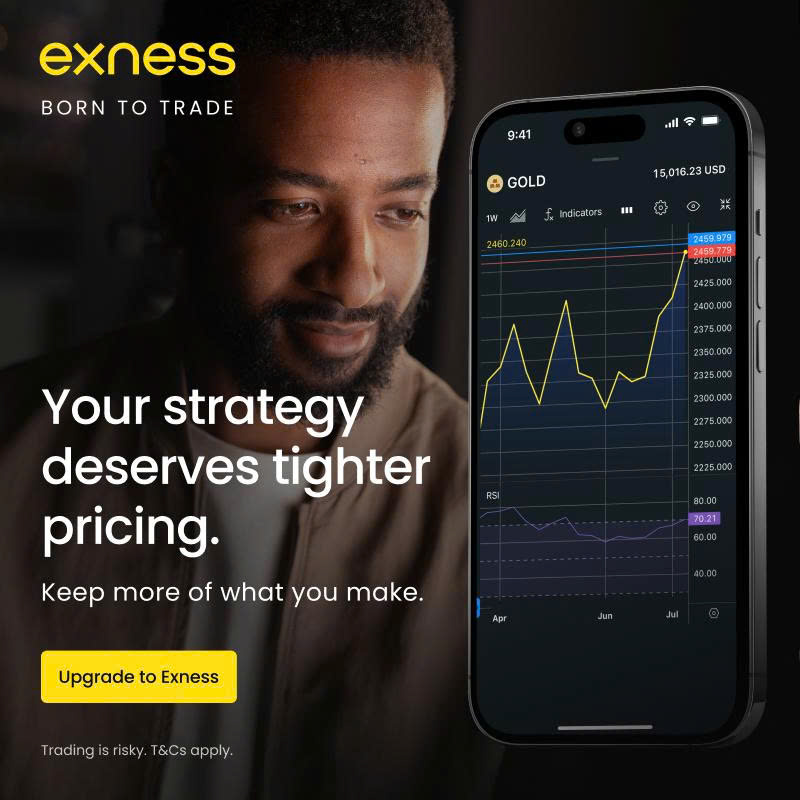
7 minute read
How to Start Forex Trading in Zimbabwe: A Clear Guide
from Exness
by Exness Blog
If you're living in Zimbabwe and wondering how to start forex trading, the process is much easier than it seems—provided you understand the right steps. Forex trading involves buying and selling currency pairs to profit from price fluctuations. It’s legal in Zimbabwe, but regulated loosely, which means you need to choose your broker wisely and educate yourself before risking your money.
Top 4 Best Forex Brokers in Zimbabwe
1️⃣ Exness: Open An Account or Visit Brokers 🏆
2️⃣ XM: Open An Account or Visit Brokers 💥
3️⃣ JustMarkets: Open An Account or Visit Brokers ✅
4️⃣ Quotex: Open An Account or Visit Brokers 🌐
Start with Understanding What Forex Trading Is
Forex (foreign exchange) trading is the act of exchanging one currency for another. For example, you might buy EUR/USD if you believe the Euro will rise against the US dollar. Unlike stock trading, the forex market is open 24 hours a day, five days a week. It’s the largest and most liquid financial market in the world. People in Zimbabwe can access it easily through international forex brokers that accept Zimbabwean clients.
Is Forex Trading Legal in Zimbabwe?
Yes, forex trading is legal in Zimbabwe, but the government does not have a strong regulatory framework in place. That means no local regulatory body oversees brokers operating within the country. For this reason, it’s important to avoid local “investment schemes” or unregulated agents who claim to trade on your behalf. Always trade through well-known, internationally regulated forex brokers like Exness, Deriv, or XM. These brokers allow Zimbabweans to open accounts, deposit via local-friendly methods like Skrill, Neteller, or even crypto, and start trading with small amounts like $10.
Step 1: Choose a Reliable Forex Broker
Your first and most important step is selecting a trusted broker. A good broker offers a user-friendly platform, fair trading conditions, and reliable deposit/withdrawal methods. Since Zimbabwe has limited banking infrastructure for online forex, choose a broker that supports e-wallets like Neteller, Skrill, or USDT (Tether). Verify that the broker is regulated by top-tier authorities like CySEC, FCA, or ASIC.
Avoid companies that promise guaranteed profits, double-your-money schemes, or require you to send money to a personal account. Real forex trading is risky and no one can promise profits.
Step 2: Open a Demo Account
Before you start using real money, open a demo account. Every good broker offers this for free. It lets you trade with virtual money in real market conditions, allowing you to practice risk-free. Use this opportunity to understand how currency pairs work, how to place orders, and how different strategies perform.
Treat demo trading seriously. Spend at least 2-4 weeks practicing. This is your training ground, and it’s better to make mistakes here than when real money is on the line.
Step 3: Verify Your Identity
Once you’re comfortable with demo trading, you can proceed to open a real account. Most brokers require a copy of your national ID or passport and a recent utility bill or bank statement for address verification. This is part of their KYC (Know Your Customer) policy to comply with anti-money laundering regulations.
Don’t worry—this is a normal process and doesn’t take more than 24-48 hours with most brokers. Make sure your documents are clear and up to date to avoid delays.
Step 4: Deposit Your Trading Capital
After your account is verified, you can fund it. In Zimbabwe, many traders use e-wallets like Skrill, Neteller, or cryptocurrencies like Bitcoin and USDT to deposit funds. Some brokers even offer internal transfer services via local agents, but be cautious with this method and only use agents recommended on the broker’s official website.
Start with an amount you can afford to lose. $10–$50 is a reasonable starting point if you’re new and just want to test live trading. Focus on learning, not earning, in the beginning.

✅ Trade with Exness now: Open An Account or Visit Brokers 👈
Step 5: Choose a Trading Platform
Most brokers offer either MetaTrader 4 (MT4), MetaTrader 5 (MT5), or their own proprietary web-based platforms. MT4 is the most popular choice among beginners due to its simplicity and availability of free indicators and trading tools. You can download the platform on your PC or smartphone.
Learn how to place market orders, set stop losses, and take profits. Always protect your trades with a stop loss. Never risk more than 1-2% of your account per trade. This protects your capital from being wiped out by just a few losing trades.
Step 6: Learn a Basic Trading Strategy
Without a strategy, you’re just gambling. A basic strategy could be something like trading breakouts, trend-following using moving averages, or using support/resistance levels. Don’t fall for “signal providers” or “auto traders” claiming 95% success rates. Most of them are scams.
Instead, focus on learning how the market works. Follow economic news, understand how different currencies behave, and test your strategy on demo or small live trades. Education and patience are key in forex trading.
Step 7: Track Your Performance
Start keeping a trading journal. After every trade, write down what you did, why you did it, and what the result was. Over time, this will help you identify patterns in your decision-making—both good and bad. Don’t expect profits every day. Even professional traders have losing days. The goal is to be consistently profitable over weeks and months.
Common Mistakes to Avoid
Many Zimbabwean beginners lose money in forex not because the market is too hard, but because they fall for shortcuts. Avoid the following:
· Trading without a stop loss: This is the fastest way to blow your account.
· Overleveraging: Just because your broker allows 1:2000 leverage doesn’t mean you should use it. High leverage increases risk.
· Trading too many pairs at once: Stick to 1-3 major pairs like EUR/USD, GBP/USD, or USD/JPY when you’re starting.
· Following random signals on social media: Most of these are untested or outright scams.
· Chasing losses: If you lose a trade, don’t immediately try to make the money back by placing another one. Take a break, review your strategy, and come back clear-headed.
Forex Trading in Zimbabwe During Economic Challenges
Due to Zimbabwe’s economic instability, forex trading might seem like a lifeline—but it’s not a get-rich-quick scheme. While it's true that forex can help you earn money in USD, especially when your local currency is losing value, it also carries real financial risk.
Instead of betting everything on trading, use it as a side skill. Start small, treat it as a long-term learning process, and grow gradually. Forex success takes time, discipline, and a lot of emotional control.
Final Thoughts
Starting forex trading in Zimbabwe is completely possible and legal if you go about it the right way. Begin with a demo account, choose a regulated broker that accepts local-friendly deposit methods, learn a simple strategy, and practice disciplined risk management. Avoid shortcuts, stay away from investment scams, and focus on developing your trading skills one step at a time.
Forex trading can be a great tool to earn in USD and build financial resilience in Zimbabwe, but only for those who approach it with patience and responsibility. If you’re serious about making forex work, the best time to start learning is today.
✅ Trade with Exness now: Open An Account or Visit Brokers 👈
Read more:










